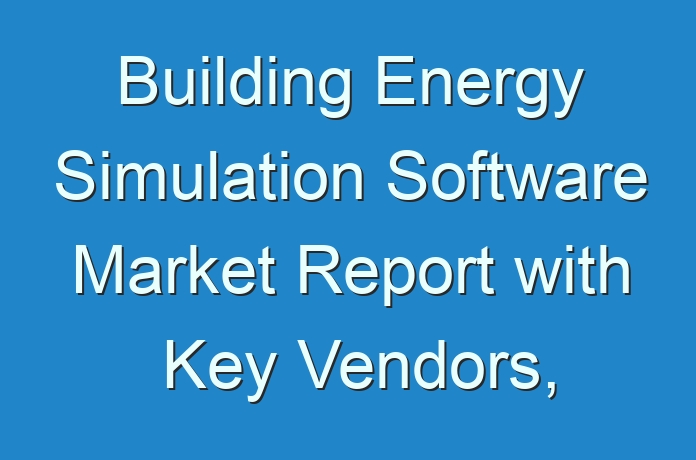
Building Energy Simulation Software Market: Introduction
Transparency Market Research delivers key insights on the global building energy simulation software market. In terms of revenue, the global building energy simulation software market is estimated to expand at a CAGR of ~16% during the forecast period, owing to numerous factors regarding which TMR offers thorough insights and forecasts in its report on the global building energy simulation software market.
Building energy simulation software is computer-based simulation software, specifically designed to perform comprehensive analysis of a building’s energy use or to analyze the energy-using systems of a building. Building energy simulation software utilizes specialized software/platform tools that address particular concerns, such as day-lighting, moisture transfer from building materials, natural ventilation, occupant comfort, and indoor air quality.
Major Key Players of the Building Energy Simulation Software Market are:
M S.A., Autodesk, Inc., Batia Construction, Carmel Software Corporation, Carrier Corporation, DesignBuilder Software Ltd, EDSL (Environmental Design Solutions Ltd), EnergyCAP, Inc., EnergyPeriscope (Solar Investments Inc), IES (Integrated Environmental Solutions) Limited, Lighting Analysts, Inc., OpenStudio (Alliance for Sustainable Energy, LLC), Performance Systems Development, Radiance Energy, Inc., Sefaira, SketchUp (Trimble Inc.), Snugg Home, LLC, Thermal Dynamics, Inc., Thermal Energy System Specialists, LLC, Trane Technologies Company, LLC, TRNSYS (Thermal Energy System Specialists, LLC), AcousticCalc, Cove Tool, Inc., EnergyElephant, EnergyPlus, eQUEST (DOE-2), kW Engineering, Inc., Ladybug Tools LLC, QwickLoad (HVAC SOFT, INC), and Spot Pro (Daylighting Innovations).
Get sample copy of “Building Energy Simulation Software Market” at: https://www.transparencymarketresearch.com/sample/sample.php?flag=S&rep_id=77350
Building Energy Simulation Software Market: Dynamics
Architects and engineers are adopting advanced design in green building infrastructure to provide comfort to resident and commercial users by reducing the negative impact of the surrounding environment. Solution providers are offering different software solutions to manage the entire lifecycle of a building and maintain the usage of energy resources in order to increase building performance. Rise in demand for green building infrastructure and design among residential and commercial sectors is estimated to increase the demand for building energy simulation software from construction and architecture service providing companies.
According to the U.S. Green Building Council (USGBC) report published in 2019, the number of green and LEED-certified homes have been increasing by 19% since 2017 with more than 400,000 units located in the U.S. The demand for green home design is increasing among customers to reduce overall expenses on energy consumption. The increase in awareness about green building structures among customers is prompting solution providers to offer advanced energy simulation software in order to reduce energy consumption and help improve the design of the building that increases the overall performance of buildings.
Global Building Energy Simulation Software Market: Segmentation
Building Energy Simulation Software Market, by Component
- Software/Platform
- Services
- Professional
- Consulting & Integration
- Support & Maintenance
- Managed
- Professional
Building Energy Simulation Software Market, by Deployment
- Cloud
- On-premise
Building Energy Simulation Software Market, by End User
- Owner
- Builder
- Researcher
Have any query? Inquiry about report at: https://www.transparencymarketresearch.com/sample/sample.php?flag=EB&rep_id=77350
Research objectives:-
– To study and analyze the global Building Energy Simulation Software consumption (value & volume) by key regions/countries, product type and application, history data.
– To understand the structure of the Building Energy Simulation Software market by identifying its various sub-segments.
– Focuses on the key global Building Energy Simulation Software manufacturers, to define, describe and analyze the sales volume, value, market share, market competitive landscape, SWOT analysis, and development plans in the next few years.
– To analyze the Building Energy Simulation Software with respect to individual growth trends, future prospects, and their contribution to the total market.
– To share detailed information about the key factors influencing the growth of the market (growth potential, opportunities, drivers, industry-specific challenges and risks).
About Us
Transparency Market Research is a global market intelligence company, providing global business information reports and services. Our exclusive blend of quantitative forecasting and trends analysis provides forward-looking insight for thousands of decision makers. Our experienced team of Analysts, Researchers, and Consultants, use proprietary data sources and various tools and techniques to gather, and analyze information.
Our data repository is continuously updated and revised by a team of research experts, so that it always reflects the latest trends and information. With a broad research and analysis capability, Transparency Market Research employs rigorous primary and secondary research techniques in developing distinctive data sets and research material for business reports.
Contact
90 State Street, Suite 700
Albany, NY 12207
Tel: +1-518-618-1030
USA – Canada Toll Free: 866-552-3453
Email: sales@transparencymarketresearch.com
Website: https://www.transparencymarketresearch.com





